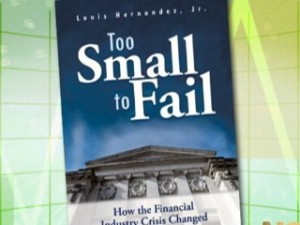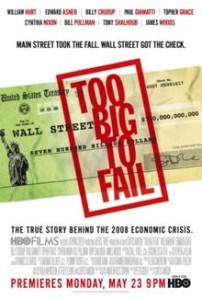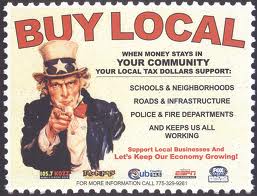Too Big to Fail versus Too Small to Fail
Buy Locally, Hire Locally, Invest Locally
I first heard the term “Too Small to Fail” as the title of a CD by satirists Mikhail Horowitz and Gilles Malkine I then did a little more research and found a book by Louis Hernandez, Too Small to Fail, about community banking.
Too Small to Fail, about community banking.
I have been thinking and writing about how local food, local energy, local businesses, community/public banking, local currencies, and resilient communities are strategically positioned to be “too small to fail” as opposed to bloated Wall Street financial Institutions, “sunset industries,” and corporate farming that have been, and probably will continue to be bailed out because they are “Too Big to Fail.” The term “too big to fail” may have been first used by Congressman Stewart McKinney in a Congressional hearing, discussing the FDIC’s intervention with Continental Illinois in 1984.
“Nearly a century ago, Justice Louis Brandeis railed against what he called the “curse of bigness.” He warned that banks, railroads and steel companies had grown so huge that they were lording it over the nation’s economic and political life. “Size, we are told, is not a crime,” Brandeis wrote. “But size may, at least, become noxious by reason of the means through which it is attained or the uses to which it is put.”
 Federal Reserve Chair Ben Bernanke also defined the term in 2010:
Federal Reserve Chair Ben Bernanke also defined the term in 2010:
“A too-big-to-fail firm is one whose size, complexity, interconnectedness, and critical functions are such that, should the firm go unexpectedly into liquidation, the rest of the financial system and the economy would face severe adverse consequences.” He continued that: “Governments provide support to too-big-to-fail firms in a crisis not out of favoritism or particular concern for the management, owners, or creditors of the firm, but because they recognize that the consequences for the broader economy of allowing a disorderly failure greatly outweigh the costs of avoiding the failure in some way. Common means of avoiding failure include facilitating a merger, providing credit, or injecting government capital, all of which protect at least some creditors who otherwise would have suffered losses…If the crisis has a single lesson, it is that the too-big-to-fail problem must be solved.”
In Andrew Ross Sorkin’s book, Too Big to Fail, the Inside Story of How Wall Street and Washington Fought to Save the Financial System and Themselves, he wrote that in a “Too Big to Fail” scenario, assertions have been made that certain financial institutions are so large and so interconnected that their failure would be disastrous to the economy, and they therefore must be supported by government when they face difficulty. The book  was adapted in 2011 for the television movie Too Big to Fail. The financial meltdown and
was adapted in 2011 for the television movie Too Big to Fail. The financial meltdown and
the global economic crisis resulting from the sub-prime mortgage debacle began to change the public’s perception of previously trusted financial institutions.
Some economists such as Paul Krugman have asserted that economies of scale in banks and in other businesses are worth preserving, so long as they are well regulated. Other economists, financial experts, bankers (like Former Citigroup Chairman & CEO Sanford I. Weill), finance industry groups, and banks themselves have called for breaking up large banks into smaller institutions and assert that a companies that benefit from these “too big to fail” policies will deliberately take risky, unsound positions, without being responsible for the losses.
Louis Hernandez, Jr., said in his book, Too Small to Fail:
“….. using historical examples, points out that the rate of change impacting the financial services industry is accelerating. The industry has been slow to respond to change, and the focus on the recent crisis has uncovered fundamental problems that financial institutions have been avoiding…”
Too Small to Fail:
Resilient communities are at the core of a Too Small to Fail future. If we don’t plan for more robust communities, and implement solutions for undeniable problems, a catastrophic crash seems inevitable. However crisis can equal opportunity as we saw during the Great Depression and during World War II. But unless sensible plans to manage disaster are formulated and put forward now, the opportunity afforded by crisis could be hijacked by a more organized well-financed minority with an authoritarian agenda.
“Our economic system has failed in every dimension: financial, environmental, and social. Moreover the current financial collapse provides an incontestable demonstration that it is unable to self-correct.… The need is not to repair Wall Street but to replace it with institutions devoted to serving the financial needs of ordinary people in ways that are fair, honest, and consistent with the reality of our human dependence on Earth’s biosphere.” David Korten,Agenda for a New Economy Continue reading

